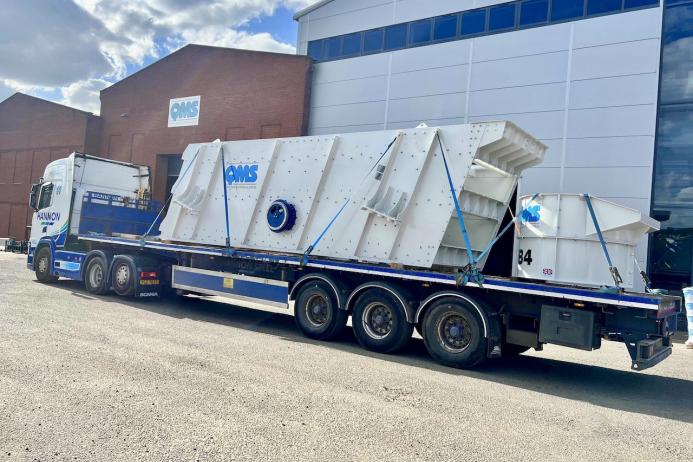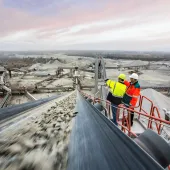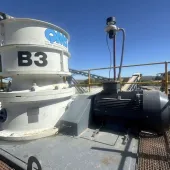QMS strive for a sustainable future
Steps being taken across company in effort to achieve more sustainable business practices
FOR Quarry Manufacturing & Supplies (QMS), sustainability and the reduction of any negative impact on the environment are key features of their offering, operations, and manufacturing process. Although proud of their existing sustainability systems, QMS are now introducing further steps to reduce any negative impact on the environment by using up-to-date manufacturing equipment and techniques that are energy and emissions efficient.
The company has also introduced measures to ensure that all staff are trained in modern manufacturing techniques and environmental awareness, as well as how to use resources efficiently.
By the very nature of screening and crushing product lines, from manufacturing to logistics, QMS say they strive to be a leading sustainability partner for their customers, aiming to help them achieve more sustainable business practices.
‘Our sustainable business strategy is based on international guidelines and principles and embedded in our everyday business practices,’ said managing director Jonathan Beck. ‘We’ve established sustainability goals for 2030 – circularity, climate change, and people – that are given the same prominence as traditional business targets. These will remain a core consideration in our development of solutions for the mining, mineral excavation, recycling, and generic construction industries.’
As part of these goals, QMS have developed rebuild solutions that prolong their mineral-processing equipment life cycles and implemented recycling programmes for steel and wear parts. They have also launched a range of initiatives to support their avowed aim of making their products and packaging ‘circular’.
‘We also aspire to dramatically reduce waste from production through reducing waste or repurposing what might otherwise be waste, thus minimizing the number of new materials we need to create,’ explained Mr Beck, who added: ‘We have also reduced carbon emissions through reformed logistics approaches and aim, at our new factory development, to capture waste heat released in production processes and redistribute it to warm our facilities. As QMS manufacture energy-efficient equipment, we also help our customers reduce their carbon footprints.’
The QMS way of doing things is essentially a way of facing a world suffering from resource scarcity, with the company believing that it has developed successful strategies for sustainable development. Indeed, QMS have embraced the philosophy of the ‘circular economy’ where resource input and waste, emissions, and energy leakage are minimized by slowing, closing, and narrowing energy and material loops. This means that components and materials are kept in the loop for as long as possible.
‘We are continually striving to see a manufacturing process where waste no longer exists and everything recirculates back into the process to convert into another product, component, or material,’ added Mr Beck.
Waste avoidance, life-cycle extension through remanufacturing or reuse, and improved recycling techniques are seen by all at QMS as important strategies for sustainable manufacturing. The manufacturing operation itself is continually invested in so that it uses the most efficient processes, with the new manufacturing plant – which is currently being constructed – set to be energy, noise, emissions, heat, light, and waste efficient.
Pollution from the existing plant is already minimized and will be further reduced when the new factory comes online. Moreover, the company recycles as much of the materials used as is possible, as well as using recycled materials, where applicable, throughout QMS’ operations.
‘Contaminated materials at the factory are now recycled/reused, as well as all equipment demonstration materials whenever possible, and dealt with by a professional waste-processing company if required. Our manufacturing plant is made from materials that minimize noise, with the new factory being designed to further reduce noise pollution. Furthermore, our equipment is designed to operate to national decibel limits and be capable of working in inner city environments when required,’ explained Mr Beck.
Manufacturing efficiency is further enhanced through QMS’s focus on product design. The company has found throughout its long and proud history that the best way to reduce material waste is to use less material from the beginning. Designing parts using methodologies such as value engineering and design for manufacturability have significantly improved efficiency.
Mr Beck explained: ‘Where possible, we recycle scraps and factory returns. Even when we are unable to use the recycled material, we sell it on to those who can, to continue the material life cycle. All our production processes are optimized to utilize all available material as we view every scrap of discarded material as representing an opportunity to improve process efficiency.’
Renewable materials are also used where possible, and through QMS’ aftermarket and spare parts business, the company aims to ensure that customers’ plants are kept operational for longer, with oil, water, steel, plastic etc being recycled and reused. In addition, QMS plants are energy and fuel efficient, using renewable sources of power where possible and using clean energy via the grid as their primary power source.
All QMS equipment is, by its very nature, manufactured to maximize the world’s minerals mineral resources, proving their worth in efficiently dealing with virgin deposits. QMS equipment is equally adept at recycling to reduce construction materials so that they can be reused and recycled. To this end QMS produce washing plant that is energy and water efficient, reusing as much of the water as possible, whilst their extensive range of crushers and screens operate under the maxim of ‘reduce, recycle, reuse’ as they crush materials and sort by size, enabling former waste materials to form valuable products that further continue the material life cycle.
‘Our aim is to use energy more efficiently with the manufacturing plant and offices being equipped with energy-efficient technology. This also extends to company transport, where travel is kept to a minimum and, where possible, we use fuel-efficient vehicles. Equipment deliveries are co-ordinated so that a minimum of vehicles is used, and when exporting, we send our equipment by container, by sea. The process is one of making sure our systems, equipment, parts, offices, and production processes are continually developed, measured, and improved to further improve our sustainability,’ concluded Mr Beck.










